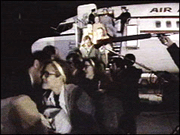 |
| The Americans had been
held since November 1979 |
| 1981: Tehran frees US hostages after 444
days |
England have
The 52 American hostages held at the US embassy in Tehran for more than
14 months have arrived in West Germany on their way home to the United
States.
The former diplomats and embassy staff stepped from the plane onto the
tarmac at Wiesbaden airport looking tired but elated after their
4,000-mile (6,437km) flight from Iran.
Some waved to the crowd of well-wishers who had gathered, others gave
the V-for-victory sign.
Iran finally agreed to release the hostages after the US said it would
release assets frozen in American and other banks, including the Bank of
England, since the embassy was seized.
Former president Jimmy Carter, appointed as President Ronald Reagan's
special envoy, has flown in to welcome home the embassy staff he had hoped
would be freed while he was still in charge at the White House.
Stories of the "abominable treatment" the men and women suffered at the
hands of their Iranian captors are beginning to emerge.
Letters from home were burned in front of the hostages, there were
regular beatings and some talked of games of Russian roulette.
The Americans were flown via Algiers to Wiesbaden, where they will now
be cared for at a military hospital while their conditions are assessed.
The US government has tried to dissuade families from flying out to
Germany for reunions with their loved ones until they have been confirmed
fit.
Reporters were able to shout a few questions to hostages who appeared
briefly on the hospital balcony. One man said they had had no idea they
were about to be released.
The hostage ordeal began in November 1979 when a group of radical
Iranian students stormed the American embassy in Tehran. Everyone inside
was taken captive.
The students were angered by American support for the Shah, who fled
into exile in January 1979 and arrived in the United States in October for
cancer treatment. They demanded the Shah's return to stand trial for
alleged crimes in office.
They had the backing of the Iranian government, led by Ayatollah
Khomeini. But their demands for the Shah's extradition were foiled when he
fled to Cairo.
The students still refused to release their hostages, however, until
President Carter was defeated in the US elections. This paved the way for
fresh negotiations with the Algerians acting as
intermediaries.